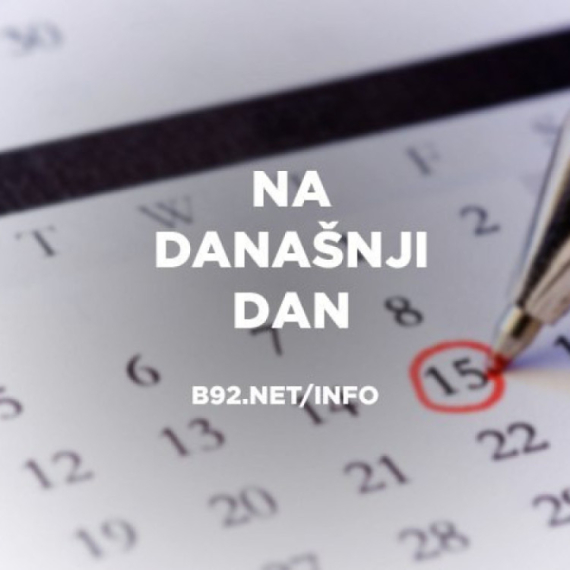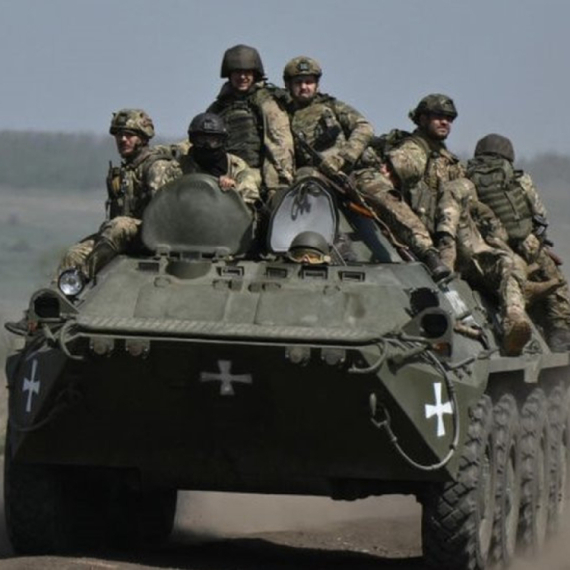Playing with fire
Sunday, 11.05.2008.
15:47

Playing with fire While at first glance this seems to be “much ado about nothing,” in fact it is part of a major disagreement over history, national identity, ethnicity, and territory that involve several regional powers. This issue, along with many similar ones, was to a large extent “frozen” during the Cold War. Its conclusion opened the door to a resurgence of nationalism with its grievances, territorial ambitions, and historical claims. If one were to ask Bulgarians, Serbs, Greeks, and the Slavic citizens of Macedonia to define the word “Macedonia,” there would be four very different, incompatible answers. The ethnic Albanians in Macedonia would probably have a fifth. All would be at least partly based on emotion and a sense of grievance and all would be grounded in selected historical truth. Of the many ethnic challenges and disputes in the Balkans, this one is the most complex and also the one with the potential to spread the violence associated with the breakup of the former Yugoslavia beyond its borders. It is interesting to contrast the responses of Greece and Bulgaria to what for both of them, was a serious challenge to their individual concept of nation, ethnicity, history, and potentially to their stability. Both went through a prolonged period of difficult relations with the new country called Macedonia. While Bulgaria was the first country to recognize the “state” of Macedonia in 1991, it took great pains to stress that was not recognizing or accepting a Macedonian language or nationality. It refused to sign any agreements with Macedonia for seven years because of the language dispute. It wrote a Constitution barring ethnically-based parties precisely with Macedonia in mind. Greece demanded changes in the Macedonian Constitution, its flag, and in its very name. At times it blocked access to its ports for goods being exported from or imported to Macedonia. The “Macedonian” question was –and remains - an important domestic political issue in both countries. At the end of the day, however, Greece and Bulgaria have come to the same fork in the road and have taken radically different paths. Bulgaria has made the fundamental decision that despite all of the problems, injustices, and domestic political concerns, it was in its own long-term interest to develop better neighborly relations with Macedonia, even if it had to “grit its teeth” in so doing. Consequently, in 1999 it recognized the Macedonian language in return for Macedonian affirmation that it would not interfere in Bulgarian internal affairs. This is not to say that the passions and conflicts have disappeared, but they are under control. Greece, on the other hand, is still keeping its dispute with Macedonia alive and in so doing, significantly hindering Macedonia’s ability to deal with its serious internal ethnic challenges. That in turn is increasing the level of instability in a very volatile region. The contrast is a direct result of the positive, moderating impact that the prospect of potential membership in NATO and the European Union can have on candidate countries. Both Bulgaria and Macedonia were eager to join both and consequently were willing to accept some painful compromises. This is the “soft power” of the EU and NATO at its very best. Greece, on the other hand, was already a member of both organizations. It therefore had no pressure to moderate its approach. Quite the contrary, it had a “weapon” it could use against Macedonia: the ability to block its membership both in NATO and the European Union. And so it has done. This points out two glaring weaknesses of the EU and NATO. The first is that new membership requires consent of all current members and this enables countries to abuse this “blackball” to force concessions from neighboring candidate countries with which they have disputes. Slovenia is now playing this game with Croatia with regard to its prospective EU membership. Greece is doing it with regard to Turkey and the EU and has now played the same card on Macedonian NATO membership. There seems to be no willingness whatsoever for either organization to change this voting procedure or to censure those abusing it. The second weakness of both organizations is that while they both have immense influence in bringing about significant transitional changes in candidate countries, they have far less ability or desire to encourage positive change in the member-countries themselves. The attitude of the Greeks towards the whole question of ethnicity is perhaps the most retrogressive in the entire Balkan region. It by law denies the existence of any ethnic group other than Greek in its country and is aggressive in combating any efforts by individuals or budding organizations to claim otherwise. This is routinely noted in various international human rights reports such as “Human Rights Watch” and the annual State Department Human Rights Reports and then…ignored. Several years ago, the Greek government protested vigorously to the US Embassy because one of its diplomats in Thessaloniki agreed to meet with a political “dissident” claiming Bulgarian origin and suffering intense discrimination as a result. What is disheartening is that this Greek attitude has not evolved at all, despite the changes which have taken place in the World and in Europe. Membership in the European Union, NATO, the United Nations and the OSCE have seemingly neither helped to modify Greek behavior or make it feel more secure. It continues to view the world from the prism of its earlier ethnic trauma. Moreover, despite continued intensive efforts, neither the United States nor the European Union has managed to budge Greece very much at all. This is not an esoteric question belonging to historians. Both Kosovo and Macedonia are highly unstable with serious internal ethnic conflicts. Each can have a positive or negative impact on the other. Macedonia faced a civil insurrection in 2001 which required the intensive intervention of the United States, the EU, and NATO to resolve. The result was the Ohrid Agreement, which gave substantial rights to Macedonia’s ethnic Albanian population. To this day it remains highly unpopular with Slavic Macedonians and enforcing its various provisions still causes heartache and discontent. Despite relative tranquility, a great deal of voluntary ethnic cleansing continues to go on, with both ethnic groups moving from areas in which they are in the minority to places where they are in the majority. As a direct result of the Bucharest Summit, nationalistic tensions are rising and the ruling Party has called for snap Parliamentary elections on June 1. A common desire to join NATO was one key thread holding both ethnic groups together. Greece’s action is helping to drive one more wedge between these groups, as well as raising nationalistic tensions in a country – and region –which absolutely needs exactly the opposite if it ever is going to stabilize. Macedonians protest Greek pressure to change their country's constitutional name (Beta) At the recent NATO Summit, Greece “spoiled the party” by blackballing the proposed membership invitation to Macedonia because of a dispute with that country over its name. William Montgomery "What is disheartening is that this Greek attitude has not evolved at all, despite the changes which have taken place in the World and in Europe. Membership in the European Union, NATO, the United Nations and the OSCE have seemingly neither helped to modify Greek behavior or make it feel more secure."
Playing with fire
While at first glance this seems to be “much ado about nothing,” in fact it is part of a major disagreement over history, national identity, ethnicity, and territory that involve several regional powers. This issue, along with many similar ones, was to a large extent “frozen” during the Cold War. Its conclusion opened the door to a resurgence of nationalism with its grievances, territorial ambitions, and historical claims.If one were to ask Bulgarians, Serbs, Greeks, and the Slavic citizens of Macedonia to define the word “Macedonia,” there would be four very different, incompatible answers. The ethnic Albanians in Macedonia would probably have a fifth. All would be at least partly based on emotion and a sense of grievance and all would be grounded in selected historical truth. Of the many ethnic challenges and disputes in the Balkans, this one is the most complex and also the one with the potential to spread the violence associated with the breakup of the former Yugoslavia beyond its borders.
It is interesting to contrast the responses of Greece and Bulgaria to what for both of them, was a serious challenge to their individual concept of nation, ethnicity, history, and potentially to their stability. Both went through a prolonged period of difficult relations with the new country called Macedonia. While Bulgaria was the first country to recognize the “state” of Macedonia in 1991, it took great pains to stress that was not recognizing or accepting a Macedonian language or nationality.
It refused to sign any agreements with Macedonia for seven years because of the language dispute. It wrote a Constitution barring ethnically-based parties precisely with Macedonia in mind. Greece demanded changes in the Macedonian Constitution, its flag, and in its very name. At times it blocked access to its ports for goods being exported from or imported to Macedonia. The “Macedonian” question was –and remains - an important domestic political issue in both countries.
At the end of the day, however, Greece and Bulgaria have come to the same fork in the road and have taken radically different paths. Bulgaria has made the fundamental decision that despite all of the problems, injustices, and domestic political concerns, it was in its own long-term interest to develop better neighborly relations with Macedonia, even if it had to “grit its teeth” in so doing.
Consequently, in 1999 it recognized the Macedonian language in return for Macedonian affirmation that it would not interfere in Bulgarian internal affairs. This is not to say that the passions and conflicts have disappeared, but they are under control. Greece, on the other hand, is still keeping its dispute with Macedonia alive and in so doing, significantly hindering Macedonia’s ability to deal with its serious internal ethnic challenges. That in turn is increasing the level of instability in a very volatile region.
The contrast is a direct result of the positive, moderating impact that the prospect of potential membership in NATO and the European Union can have on candidate countries. Both Bulgaria and Macedonia were eager to join both and consequently were willing to accept some painful compromises. This is the “soft power” of the EU and NATO at its very best. Greece, on the other hand, was already a member of both organizations. It therefore had no pressure to moderate its approach. Quite the contrary, it had a “weapon” it could use against Macedonia: the ability to block its membership both in NATO and the European Union. And so it has done.
This points out two glaring weaknesses of the EU and NATO. The first is that new membership requires consent of all current members and this enables countries to abuse this “blackball” to force concessions from neighboring candidate countries with which they have disputes. Slovenia is now playing this game with Croatia with regard to its prospective EU membership. Greece is doing it with regard to Turkey and the EU and has now played the same card on Macedonian NATO membership. There seems to be no willingness whatsoever for either organization to change this voting procedure or to censure those abusing it.
The second weakness of both organizations is that while they both have immense influence in bringing about significant transitional changes in candidate countries, they have far less ability or desire to encourage positive change in the member-countries themselves.
The attitude of the Greeks towards the whole question of ethnicity is perhaps the most retrogressive in the entire Balkan region. It by law denies the existence of any ethnic group other than Greek in its country and is aggressive in combating any efforts by individuals or budding organizations to claim otherwise. This is routinely noted in various international human rights reports such as “Human Rights Watch” and the annual State Department Human Rights Reports and then…ignored. Several years ago, the Greek government protested vigorously to the US Embassy because one of its diplomats in Thessaloniki agreed to meet with a political “dissident” claiming Bulgarian origin and suffering intense discrimination as a result.
What is disheartening is that this Greek attitude has not evolved at all, despite the changes which have taken place in the World and in Europe. Membership in the European Union, NATO, the United Nations and the OSCE have seemingly neither helped to modify Greek behavior or make it feel more secure. It continues to view the world from the prism of its earlier ethnic trauma. Moreover, despite continued intensive efforts, neither the United States nor the European Union has managed to budge Greece very much at all.
This is not an esoteric question belonging to historians. Both Kosovo and Macedonia are highly unstable with serious internal ethnic conflicts. Each can have a positive or negative impact on the other. Macedonia faced a civil insurrection in 2001 which required the intensive intervention of the United States, the EU, and NATO to resolve. The result was the Ohrid Agreement, which gave substantial rights to Macedonia’s ethnic Albanian population. To this day it remains highly unpopular with Slavic Macedonians and enforcing its various provisions still causes heartache and discontent.
Despite relative tranquility, a great deal of voluntary ethnic cleansing continues to go on, with both ethnic groups moving from areas in which they are in the minority to places where they are in the majority. As a direct result of the Bucharest Summit, nationalistic tensions are rising and the ruling Party has called for snap Parliamentary elections on June 1. A common desire to join NATO was one key thread holding both ethnic groups together. Greece’s action is helping to drive one more wedge between these groups, as well as raising nationalistic tensions in a country – and region –which absolutely needs exactly the opposite if it ever is going to stabilize.

























































Komentari 41
Pogledaj komentare